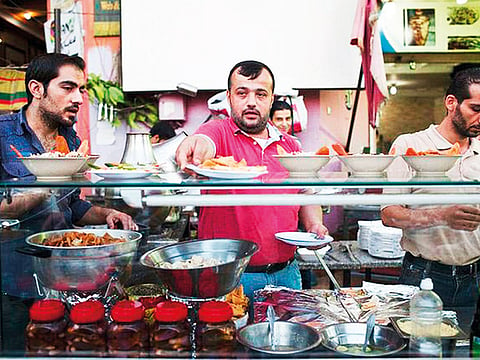For Syrians in Egypt, home return is distant dream
Al Assad’s military victories and expropriation law demoralise Syrians in Egypt

Cairo: When Syrian Abu Amr came to Egypt seven years ago fleeing the war in his homeland, he thought that his stay would not be longer than months.
“At the time, I believed that the war would be short and that the world would assist the revolutionaries in ending the murderous regime of [Bashar] Al Assad,” said Abu Amr, who hails from Aleppo.
“But Al Assad is still there and even planting his feet in dear Syria with support from the Russians,” the 49-year-old man said passionately. “They even took Aleppo.”
In late 2016, Al Assad’s forces, supported by air power from allied Russia, retook full control of Aleppo from the opposition in the biggest victory for the Syrian regime since the conflict that erupted in 2011.
Abu Amr, who works at a Syrian restaurant in Cairo, said he has lost hope for returning to the homeland.
“The world has accepted the presence of Bashar at the top of power despite his crimes. After the series of his victories, he did not expect a strong international reaction to his evil Law 10,” he told Gulf News.
Abu Amr was referring to a controversial decree issued by Al Assad in April authorising the Syrian regime to seize private property whose owners could not provide legal documents to prove their ownership.
“Legal documents? We left everything behind when we escaped the crazy killing machine of Bashar in Syria,” said Abu Amr, who declined to give his real name for fear of retaliation from the Syrian authorities against his relatives who are still in the homeland.
Several rights groups have condemned the law, saying it targets Al Assad’s opponents. The Syrian regime has defended the law, saying it is necessary for redevelopment of the war-devastated areas in the country.
Abu Amr is staying in Egypt with his three children after his wife was killed by a stray shell in the early days of the war in Syria.
“I hope that my children will live longer than me and be able to go back to Syria, but only after Al Assad and Russians are gone.”
Around 115,000 Syrians are residing in Egypt, according to the UN refugee agency. Many of them own businesses, mainly eateries and sweets shops.
“The Shami [Levant] food is very popular among Egyptians,” said Khalil, who owns a restaurant in east Cairo. “The stores selling this food are now almost everywhere in Egypt. They are spread like the hand carts selling stewed beans at Egyptian street corners,” the 54-year-old Syrian added jokingly. He employs several of his compatriots. “Syrians are skilful cooks. In addition, this job is better for them than begging on the streets.”
Khalil, who refused to give his full name for security reasons, said he is also supported by his wife, who makes recipes at home and markets them online.
“In view of the developments in Syria, our stay here seems will be longer than we expected in the beginning,” he said. “My hometown Eastern Ghouta is now under the regime’s iron fist,” Khalil added, referring to a once-opposition stronghold near the capital Damascus. Earlier this year, the Syrian regime retook Eastern Ghouta after a brutal military campaign and an evacuation deal with rebel fighters.
“I won’t see my house there again. I learnt from relatives there that the house was destroyed in the recent [Syrian] regime attack,” Khalil said despondently.
“I feel that my roots in Syria have been chopped. Thank God, we are in Egypt where we feel at home. At least we are not living inside refugee camps. We are having a good and secure life with our Egyptian brothers who treat us well,” added the father of two.
“But, the financial burden on us is increasing after the recent rises in residency charges.”
Egyptian authorities this month hiked annual residency fees for foreigners from 30 Egyptian pounds (Dh6.17) to 500 pounds as part of steep increases that also included fees of applying for naturalisation, work permits and car licences.
The hikes come as the country of about 100 million is seeking to boost its revenues, curb a budget deficit and heal its ailing economy.



